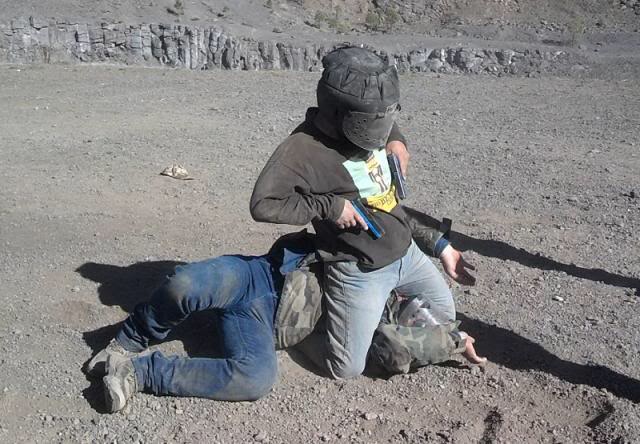You do not have to spend much time perusing the internet for advice in the training community to realize that there are a lot of short and pithy phrases that are continually trotted out and substituted for actual advice.
We’ve all heard them. “Don’t go to the ground in a street fight”, “don’t jerk the trigger”, “just walk away”, “if they try to do X just shoot them, and on and on. All these bits of pieces of advice sound great and are exceptionally easy to write or say. And at first thought they often SEEM to make a lot of sense. The problem is that they are completely useless and don’t actually mean anything because they don’t tell us how to accomplish the goal!
It is only in the self-defense training community that we expect such simplistic sentences to matter. In any other aspect or area of our lives we know we need more information and description to go along with the pithy phrase.
For example nobody ever says “ just fly a plane”,or “just fix that broken bone yourself”. Would we listen to anybody who told us to just eat healthier and then walked away? What constitutes “healthy eating”? Ask any smoker how helpful it is when someone says you should “just quit.” Sure, they can just make the decision and do it as easy as not watching that particular Netflix show. All of those little tidbits should be treated with the level of respect they deserve. In other words, they should be ignored and belittled.
We know any tasks require information, guidance, instruction, and critical thought. Anything important that requires physical action cannot just be done with the snap of the fingers. And yet in the self-defense world the most crucial ideas are espoused too often with a level of useless simplicity.
For example, let’s look at the critical advice about “don’t jerk the trigger“. If you’re teaching somebody new to shooting why in the world would they know how NOT to do something? It is all new to them, and if they don’t know how it should correctly feel, then how can they tell when they are doing it incorrectly? Telling them not to jerk the trigger does not tell them how to do it in the correct manner just as if you taught someone who had never driven before to not smash the brake pedal when slowing for a stop. A new person has never even touched a pedal sitting behind a wheel, so how are they supposed to know how it feels, good or bad? It has to be physical guidance of some kind. If they’ve not ingrained the ability to smoothly press the trigger backwards in a straight line then they have no idea of what they’re supposed to do and they’re not yet built the ability to know the difference between jerking the trigger and pressing the trigger. It is the same thing to the new person, and they need to understand what the right way looks and feels like to where they can ingrain it themselves.
My personal favorite bit of advice that really irritates me is “don’t go to the ground in a street fight”. Sounds great, and is what I would prefer! Except how do I not let that happen? What are the mechanisms that are responsible for a fight going to the ground? If you cannot explain how that occurs, then there is no way to physically achieve the desired goal. Unless you think people just fall down voluntarily under stress, or that someone regardless of all that is going on will just mindlessly drop down to the ground and “Shout get in my guard!” which is a favored straw man that the anti-grappler combatives guys love to cite, even though they cannot find where it actually and verifiably happened.
If you cannot explain the importance of Base, Posture, hip position, and the proper use of head and arms, then you have absolutely no business telling somebody don’t go to the ground. When you do so without that knowledge you have given the exact equivalent of telling somebody how to land a jet airplane by saying “just land it”. From the perspective of actually accomplishing the preferred endstate, both phrases are equally helpful.
In summary, don’t be intellectually lazy. If you wish to contribute to the dialogue, be specific and helpful with actionable guidance. Otherwise, be silent and learn.

